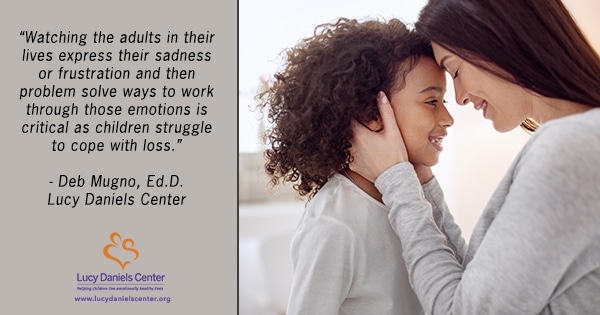Mental Health Mondays:
The Summer of Our Discontent?
by Deborah Mugno, Ed.D.
Director of Education/Operations
Lucy Daniels Center
Parents are having to help their children work through so many disappointments as they may face cancelled vacations, camps that have closed, and broken promises to attend sporting events or long-awaited movie premiers that are just not happening this summer. Meltdowns, anger, frustration, and sadness are to be expected, but how parents and caregivers react to these expressions can have meaningful impact on a child’s growth and resilience. Parents are also having to deal with their own disappointments as well and also feelings that they let their children down by not being able to fulfill their children’s expectations and longings.
When children, particularly young children experience loss, they do not have a broader context to put their loss into perspective. They do not understand that the rhythm of life can and will be a series a joys as well as disappointments and that “this too shall pass.” They focus on the here and now. In addition, young children may not have a solid concept of the passage of time. Children of all ages may feel a total loss of control. How can parents and caregivers help?
- First, adults can acknowledge and validate a child’s feelings with empathy; the disappointments that children are experiencing ARE a big deal. Adults can also reveal their own disappointments and talk about how sad they might be that plans have been changed or cancelled. We know that children look to caregivers as models, so watching the adults in their lives express their sadness or frustration and then problem solve ways to work through those emotions is critical as children struggle to cope with loss.
- Parents and caregivers can assist children in finding things that they can control. Whenever feasible, include children in decisions about alternate plans (as is developmentally appropriate) and in the creation of new or different experiences. Is backyard camping an option? What about pitching a tent in the living room?
- Adults will want to be careful when making promises that may not be kept. Telling a child that a trip might happen later in the summer when there is no guarantee that pandemic conditions will allow for rescheduling, can lead to a loss of trust and another round of meltdowns.
- Parents can reassure children that the changes in plans are not their fault and that they are not alone in their disappointment. Supporting children as they come up with ways to handle their emotions instill confidence and pride in their ability to problem solve. For example, a parent might say, “I know you really wanted to go to the beach, but what a good idea you have to put our beach umbrella by your swimming pool and to use your special beach towel. What do you think? Shall we also pack a picnic lunch?”
As we continue to look for silver linings in our global pandemic experience, by helping children successfully work through loss and thus build resilience, we are providing them with a protected platform on which to develop critical life skills.
Lucy Daniels Center is currently operating via telehealth services due to Covid-19. If you would like to request a consultation with a mental health clinician, please click here:https://tinyurl.com/slx79fe
Lucy Daniels School is a therapeutic day school for children who are experiencing social, emotional, or behavioral difficulties at home or in school.
To find out more, visit our website: https://www.lucydanielsschool.org/

